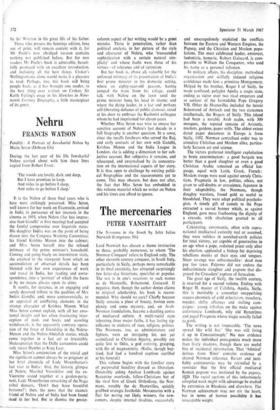The mercenaries
PETER VANSITTART
Lord Norwich has chosen a theme instructive to those, probably numerous, to whom The Norman Conquest' refers to England only. The other eleventh century conquest, in South Italy, particularly in Sicily, perhaps more remarkable in its final creativity, has attracted surprisingly few latter-day historians, specialist or popular. The test is in one's reactions to such names as de Hauteville, Bohemund, .Guiscard. If negative, then, though the author denies claims to original scholarship, his book is recom- mended. Why should we care? Chiefly because Sicily remains a place of beauty, human com- plexity and some mystery, and, on Arab- Norman foundations, became a dazzling centre of mediaeval culture. A multi-racial state tolerating three major faiths, it has lasting sig- nificance to students of race, religion, politics. The Normans, too, as administrators and fighters, were an intriguing lot, not yet assimilated to Christian bigotry, possibly not quite lost to Odin, a god cunning, grasping, with fits of magnanimity. (Rollo, though bap- tised, had had a hundred captives sacrified at his funeral.) This volume begins with the familiar story of purposeful banditry dressed as liberation. Ostensibly aiding Apulian Lombards against Byzantine overlords, fellow-Christians but of the rival firm of Greek Orthodoxy, the Nor- mans, notably the de Hautevilles, quickly grabbed strategic footholds. Mercenaries with a flair for nosing out likely winners, the new- comers, despite internal rivalries, successfully and unscrupulously exploited the conflicts between the Eastern and Western Empires, the Papacy, and the Christian and Moslem popu- lations. The most celebrated leader, extrovert, hedonistic, homeric, Robert Guiscard, is com- parable to William. the Conqueror, who used his name as a personal talisman.
In military affairs, his discipline, methodical organisation and skilfully induced religious confidence made him a primitive Montgomery. Helped by his brother, Roger I of Sicily, he made confused, polyglot Apulia a single state, ending as victor over two rival emperors and as saviour of the formidable Pope Gregory VII. Other de Hautevilles included the heroic Bohemund of Antioch and the two statesmen intellectuals, the Rogers of Sicily. This island had been a notable Arab realm, with 300 mosques, the reputed remains of Aristotle, markets, gardens, paper mills. The oldest extant dated paper document in Europe is from Sicily, 1102. Norman centralised order was to stimulate Christian and Moslem alike, particu- larly Saracen art and science.
The victors preferred intelligent exploitation to brute extermination: a good bargain was better than a good slaughter or even a good Christian. Arabic remained an official lan- guage, equal with Latin, Greek, French: Moslem troops were used against unruly Chris- tians. Pragmatic in law, politics, ethics, not given to self-doubts or conscience, Japanese in their adaptability, the Normans, though doughty warriors, found gold as useful as bloodshed. They were adept political psycholo- gists. A timely gift of camels to the Pope extracted a sacred banner which, as against England, gave mass freebooting the dignity of a crusade, with absolution granted to all participants.
Calculating, unromantic, often with supra- national intellectual curiosity real or assumed, they were ruthless in scorched-earth policies for total victory, yet capable of generosities in an age when a pope, ordained priest only after his election, applauded a bishop for depriving rebellious monks of their eyes and tongues. Sheer revenge was unbusinesslike: dead men pay few taxes. Palermo did not endure the indiscriminate slaughter and pogrom that dis- graced the Crusaders' capture of Jerusalem.
The great age of Sicily, the twelfth century, is reserved for a second volume. Ending with Roger II, master of Calabria, Apulia, Sicily, this is inevitably a somewhat unappetising success-chronicle of cold eclecticism, treachery, murder, shifty alliances and shifting cam- paigns: young tribalists on the make against unfortunate Lombards, wily old Byzantines and papal Prosperos whose magic usually failed to jyork.
The writing is not impeccable. 'The news spread like wild fire.' She was still living it up in Constantinople.' No new evidence makes the individual protagonists much more than lively shadows, though there are useful bits of incidental information. That 'Admiral' derives from 'Emir' contains evidence of shrewd Norman tolerance. Recent and justi- fiable controversies may be rekindled by a reminder that the first official mediaeval Roman pogrom was instituted by the papacy, 190. The racial sections of this industriously compiled work might with advantage be studied by extremists in Rhodesia and elsewhere. The Norman achievement may not stir the heart, but in terms of human possibility it has inescapable weight.






























 Previous page
Previous page